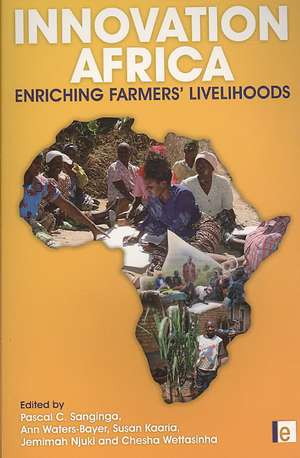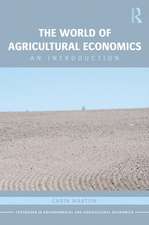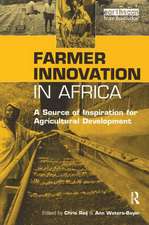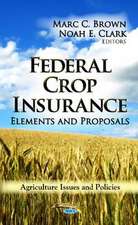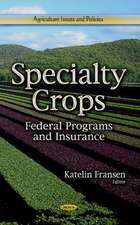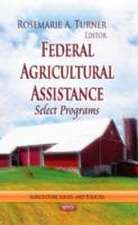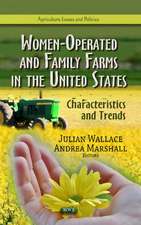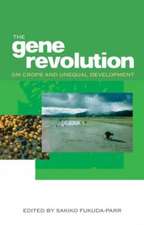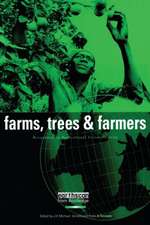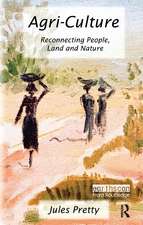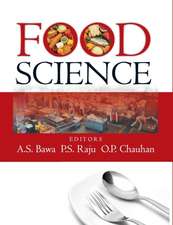Innovation Africa: Enriching Farmers' Livelihoods
Editat de Pascal Sanginga, Ann Waters-Bayer, Susan Kaaria, Jemimah Njuki, Chesha Wettasinhaen Limba Engleză Paperback – 20 noi 2008
Preț: 221.13 lei
Preț vechi: 261.31 lei
-15% Nou
Puncte Express: 332
Preț estimativ în valută:
42.32€ • 44.02$ • 34.94£
42.32€ • 44.02$ • 34.94£
Carte tipărită la comandă
Livrare economică 15-29 aprilie
Preluare comenzi: 021 569.72.76
Specificații
ISBN-13: 9781844076727
ISBN-10: 1844076725
Pagini: 432
Dimensiuni: 156 x 234 x 33 mm
Greutate: 0.7 kg
Ediția:1
Editura: Taylor & Francis
Colecția Routledge
Locul publicării:Oxford, United Kingdom
ISBN-10: 1844076725
Pagini: 432
Dimensiuni: 156 x 234 x 33 mm
Greutate: 0.7 kg
Ediția:1
Editura: Taylor & Francis
Colecția Routledge
Locul publicării:Oxford, United Kingdom
Public țintă
Academic and Professional Practice & DevelopmentCuprins
Foreword by Peter Matlon1: Innovation Africa: An IntroductionPart I: Innovation Concepts and Methods2: Conceptual and Methodological Developments in Innovation3: Comparison of Frameworks for Studying Grassroots Innovation: Agricultural Innovation Systems and Agricultural Knowledge and Innovation Systems4: Applying the Innovation Systems Concept in the Field: Experiences of a Research Team in Uganda5: Developing the Art and Science of Innovation Systems Enquiry: Alternative Tools and Methods, and Applications to Sub-Saharan African AgriculturePart II: Strengthening Social Capital in Agricultural Innovation Systems6: Harnessing Local and Outsiders Knowledge: Experiences of a Multi-Stakeholder Partnership to Promote Farmer Innovation in Ethiopia7: An Innovation System in the Rangelands: Using Collective Action to Diversify Livelihoods among Se.led Pastoralists in Ethiopia8: Social Networks and Status in Adopting Agricultural Technologies and Practices among Small-Scale Farmers in Uganda9: From Participation to Partnership: A Different Way for Researchers to Accompany Innovation Processes - Challenges and DifficultiesPart III: Policy, Institutional and Market-led Innovation10: Participatory Analysis of the Potato Knowledge and Information System in Ethiopia, Kenya and Uganda11: Enabling Rural Innovation: Empowering Farmers to Take Advantage of Market Opportunities and Improve Livelihoods12: Doing Things Differently: Post-Harvest Innovation Learning Alliances in Tanzania and Zimbabwe13: Alternative Funding Mechanisms for Local Innovation Systems14: Tracking Outcomes of Social and Institutional Innovations in Natural Resource ManagementPart IV: Local Innovation Processes15: Recognizing and Enhancing Processes of Local Innovation16: Building Institutions for Endogenous Development: Using Local Knowledge as a Bridge17: Village Information and Communication Centres in Rwanda18: Farmer Field Schools for Rural Empowerment and Life-Long Learning in Integrated Nutrient Management: Experiences in Eastern and Central Kenya19: From Strangler to Nourisher: How Novice Rice Farmers Turned Challenges into OpportunitiesPart V: Building Capacity for Joint Innovation20: Strengthening Inter-Institutional Capacity for Rural Innovation: Experience from Uganda, Kenya and South Africa21: Building Competencies for Innovation in Agricultural Research: A Synthesis of Experiences and Lessons from Uganda22: Shaping Agricultural Research for Development to Africa s Needs: Building South African Capacity to Innovate23: Going to Scale with Facilitation for Change: Developing Competence to Facilitate Community Emancipation and Innovation in South Africa24: Building Capacity for Participatory Monitoring and Evaluation: Integrating Stakeholders Perspectives25: Innovation Africa: Beyond Rhetoric to PraxisIndex
Notă biografică
Pascal Sanginga is a Senior Programme Specialist in Rural Poverty and Environment at the International Development Research Centre (IDRC), based in Nairobi, Kenya. Previously, he was a Senior Social Scientist with the International Centre for Tropical Agriculture (CIAT) and a Research Fellow with the Participatory Research and Gender Analysis Systemwide Programme on the Consultative Group on International Agricultural Research (CGIAR), hosted by the Africa Highlands Initiative. His research and publications focus on rural innovation systems, social capital and multistakeholder processes for social learning and environmental governance.
Ann Waters-Bayer is an agricultural sociologist in the EcoCulture unit of the Netherlands-based nongovernmental research and development organisation ETC Foundation. She focuses on psychological and institutional aspects of participatory approaches to research and communication. She is a member of the International Support Team for PROLINNOVA (PROmoting Local INNOVAtion in ecologically-oriented agriculture and natural resource management), a Global Partnership Programme of the Global Forum on Agricultural Research (GFAR) that operates through country and regional programmes in Africa, Asia and Latin America.
Susan Kaaria is a Program Officer for Environment and Economic Development, in the Eastern Africa Office of the Ford Foundation in Nairobi, Kenya. She has a background in forest resource economics and agricultural economics. Prior to joining the Foundation, she was a Senior Scientist with CIAT, based in Kampala, Uganda, where she developed innovative participatory approaches to increasing access to, engagement in and benefits from local, national and regional markets by poor and marginalised communities.
Jemimah Njuki is a Senior Scientist with CIAT, based in Harare, Zimbabwe. She has a background in rural development and has been working on participatory monitoring and evaluation systems to improve decision-making, organisational learning and change. She is also involved in gender research in Eastern and Southern Africa.
Chesha Wettasinha is an agriculturist in the EcoCulture unit of ETC Foundation. She has over 20 years' experience in agriculture and natural resource management, combining technical, social and organisational aspects of research and development. She currently specialises in capacity building in participatory innovation development, process documentation and editing of journals and books to make relevant field experiences accessible for wider sharing and learning. She is a member of the International Support Team for PROLINNOVA.
Ann Waters-Bayer is an agricultural sociologist in the EcoCulture unit of the Netherlands-based nongovernmental research and development organisation ETC Foundation. She focuses on psychological and institutional aspects of participatory approaches to research and communication. She is a member of the International Support Team for PROLINNOVA (PROmoting Local INNOVAtion in ecologically-oriented agriculture and natural resource management), a Global Partnership Programme of the Global Forum on Agricultural Research (GFAR) that operates through country and regional programmes in Africa, Asia and Latin America.
Susan Kaaria is a Program Officer for Environment and Economic Development, in the Eastern Africa Office of the Ford Foundation in Nairobi, Kenya. She has a background in forest resource economics and agricultural economics. Prior to joining the Foundation, she was a Senior Scientist with CIAT, based in Kampala, Uganda, where she developed innovative participatory approaches to increasing access to, engagement in and benefits from local, national and regional markets by poor and marginalised communities.
Jemimah Njuki is a Senior Scientist with CIAT, based in Harare, Zimbabwe. She has a background in rural development and has been working on participatory monitoring and evaluation systems to improve decision-making, organisational learning and change. She is also involved in gender research in Eastern and Southern Africa.
Chesha Wettasinha is an agriculturist in the EcoCulture unit of ETC Foundation. She has over 20 years' experience in agriculture and natural resource management, combining technical, social and organisational aspects of research and development. She currently specialises in capacity building in participatory innovation development, process documentation and editing of journals and books to make relevant field experiences accessible for wider sharing and learning. She is a member of the International Support Team for PROLINNOVA.
Recenzii
'Innovation by, with and for farmers in Africa is one of the major contemporary challenges of development. This book will be essential reading for anyone interested in these issues.'Professor Ian Scoones, Institute of Development Studies at the University of Sussex, UK'This book takes the theme of innovation, and its mainstreaming in research and extension, a major step forward. I am impressed by the wide range of subjects and the diversity of authors.'Chris Reij, Vrije Universiteit Amsterdam, The Netherlands'The book is strongly recommended to agricultural scientists, university teachers, agricultural research managers and extension staff.'Experimental Agriculture
